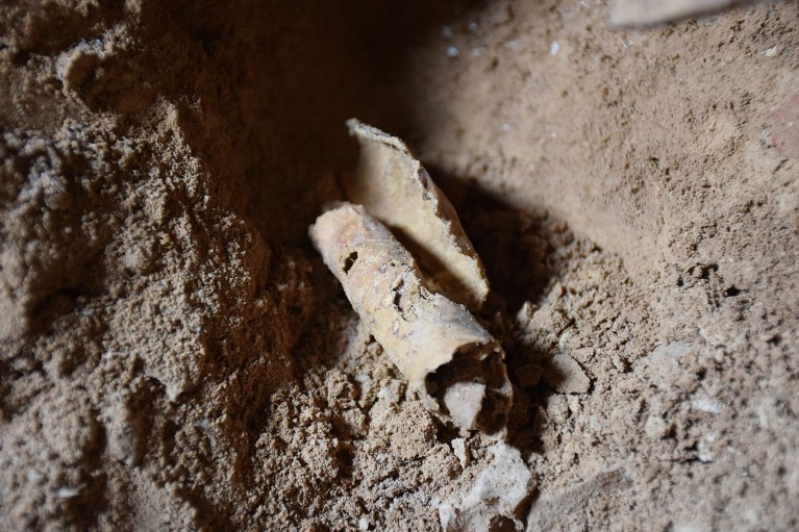
Evidence of a 12th cave related to the Dead Sea scrolls was found this week by Hebrew University of Jerusalem researchers. Archeologists, including Oren Gutfeld and Ahiad Ovadia from the university's Institute of Archeology -- aided by Randall Price and students of Liberty University in Virginia -- are the first people in more than 60 years to have discovered a new scroll cave. Prior to this find, it was believed only 11 caves had contained the coveted scrolls.
The scrolls are thought to be from the Second Temple period. After excavating the ancient hollow, located near the sea's northwestern shore, the researchers concluded the additional scrolls were looted by Bedouin residents in the middle of the last century, reports The Jerusalem Post.
"Numerous storage jars and lids from the Second Temple period were found hidden in niches along the walls of the cave and deep inside a long tunnel at its rear," said Gutfeld, who directed the dig.
"The jars were all broken and their contents removed, and the discovery toward the end of the excavation of a pair of iron pickax heads from the 1950s, stored within the tunnel for later use, proves the cave was looted."
Scholars said that like in "Cave 8," in which scroll jars but no scrolls were found, this cave will receive the designation Q12 (the Q=Qumran, standing in front of the number to indicate no scrolls were found).
Between 1947 and 1956, the Dead Sea Scrolls were found in a series of 11 caves located near the site of Qumran in what is now the West Bank. The scrolls contain copies of books of the Hebrew Bible along with community rules, calendars and astronomical texts, among other writings.
"This exciting excavation is the closest we've come to discovering new Dead Sea scrolls in 60 years," said Gutfeld. "Until now, it was accepted that Dead Sea scrolls were found only in 11 caves at Qumran, but now there is no doubt that this is the 12th cave."
Despite not finding more scrolls, Gutfeld said the evidence uncovered in the cave unequivocally confirms it once contained the documents. "Although at the end of the day no scroll was found, and instead we 'only' found a piece of parchment rolled up in a jug that was being processed for writing, the findings indicate beyond any doubt that the cave contained scrolls that were stolen," he said.
"Those findings include the jars in which the scrolls and their coverings were hidden, a leather strap for binding the scroll, a cloth that wrapped the scrolls, tendons and pieces of skin connecting fragments, and more."
The finds from the excavation also include fragments of scroll wrappings, a string that tied the scrolls, and a piece of leather that was a part of a scroll, he said.
Gutfeld said relics of pottery, numerous flint blades, arrowheads and a decorated stamp seal made of carnelian (a semi-precious stone), also revealed the cave was used in the Chalcolithic and Neolithic, or Bronze and Stone Age, periods.
"This first excavation to take place in the northern part of the Judean Desert as part of 'Operation Scroll' will open the door to further understanding the function of the caves with respect to the scrolls, with the potential of finding new scroll material," he said.
"The material, when published, will provide important new evidence for scholars of the archeology of Qumran and the Dead Sea caves."
Israel Hasson, director-general of the Israel Antiquities Authority, said this important discovery of another scroll cave attests to the fact that work remains to be done in the Judean Desert. He believes finds of huge importance are still waiting to be discovered.
"We are in a race against time, as antiquities thieves steal heritage assets worldwide for financial gain. The State of Israel needs to mobilize and allocate the necessary resources in order to launch a historic operation, together with the public, to carry out a systematic excavation of all the caves of the Judean Desert."
Some of the thousands of fragments of Dead Sea Scrolls now in museums or private collections could have come from this new cave rather than the 11 previously known caves, Gutfeld said in Yahoo Live Science. "Finding this additional scroll cave means we can no longer be certain that the original locations (Caves 1 through 11) attributed to the Dead Sea scrolls that reached the market via the Bedouins are accurate," Gutfeld said in a statement.
The excavation was supported in part by the Civil Administration of Judea and Samaria, Israel Nature and Parks Authority, and Israel Antiquities Authority. Its findings are now part of the new "Operation Scroll," launched by Hasson to undertake systematic surveys and to excavate the caves in the Judean Desert.






